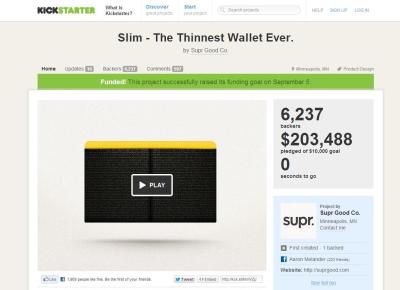By DAVID LIAN
alltherage@thestar.com.my
KICKSTARTER is not a store,” wrote the foudners of Kickstarter.com in a blog post last month.
And yet, fans of the site seem to have largely ignored the founders’ plea. The fans, despite several warnings, are still “investing” in Kickstarter projects that promise to deliver goodies they’ve always wanted but couldn’t find elsewhere.
So what is Kickstarter?
Kickstarter.com launched in 2009 as a platform to fund creative projects via crowdfunding. The idea was simple – if you had a brilliant idea but no funds to do it, you could post it up on Kickstarter, and generous netizens could pledge to fund your project out of goodwill.
These projects could be wide and varied – from an independent film-maker’s pet project for an entertaining film, to physical products such as mugs, pens or bags.
Here’s the twist. Somewhere along the line, Kickstarter devised a mechanism allowing project starters to promise “backer rewards” as a means to get people to back their projects.
So, for example, if Madonna had launched a Kickstarter project for a concert, she could offer a reward for people who pledged US$50 (RM150) or more in the form of a free ticket. Or, if you were designing the best mug in the world, you could offer to reward backers who pledged US$10 (RM30) or more, a free mug.
Between 2011 and 2012, Kickstarter exploded. It started with video games that people wanted to see made but until now, no major game publisher would fund. Games like Wasteland 2 raised nearly US$3mil (RM9.2mil) in funds and captured the imagination of the masses.
The game’s developers were able to design and get funding for the project without having to go to major game publishers.
And the reward for the backers? Copies of the game, limited edition premiums and even dinners with the development team depending on how much money you backed. Plus, the satisfaction of seeing a game you wanted to see made, actually made.
The next wave was the advent of the “Kickstarter as a store” concept. Leading the way was the Pebble watch – a massive Kickstarter project that raised around US$10mil (RM30mil). The idea was for a truly digital watch, with an e-ink watchface that could synchronise with iOS or Android mobile phones. It would also have an accelerometer to help track how far you’ve run in a day. For all intents and purposes, the Pebble is a geek’s dream watch.
For a pledge of US$120 (RM370), you could reserve a watch for yourself once the project is done. For US$1000 (RM3000), you could get 10 watches. Soon, everyone’s jumping in on the project, and lining up to get the project funded. The result? Kickstarter.com starts feeling a bit like a store.
Confession: I’ve actually been treating Kickstarter as a store. It’s a really good store. In the past year, I’ve funded three computer games I want to see made, two pens that I thought I’d like, one watch, the Pebble watch, and two slimline minimalist wallets. You could call me a Kickstarter addict, but I think the idea works.
In Kickstarter, you get to back a product you really wished were real, and make it a reality.
Remember I mentioned something about Kickstarter and risks earlier?
Yes, “Kickstarter is not a store”.
The tide of unfulfilled pledges had risen to a point where it seemed that people were misusing the website to raise money, and then disappearing from the scene with the funds. Yes, that is a very big risk.
In fact, Kickstarter had to clarify that it was a platform to raise funds for projects people loved, but fans also had to understand that project owners would be fully responsible for delivering the goods once the project is successful.
It’s not a store, and you’re not buying a finished product. You’re giving someone money, in hopes that they will successfully execute the project, and reward you as promised.
That’s a big risk. And I’d like to underline that again.
But what we don’t need is for Kickstarter to go away (and I doubt it will). The idea is a really solid one, so much so that there’s even a local version at www.pitchin.my. It gives young people the opportunity to create and sell things and others to buy things we really want.
So, Kickstarter may not be a store, but for people like me who just love seeing new ideas come to market – it’s a pretty good one already.


Leave a reply